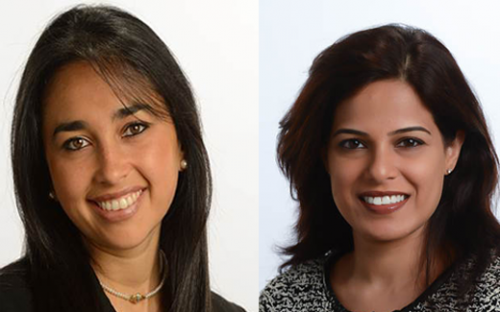Just 4 per cent of CEOs at Fortune 1000 companies are female. But two HEC MBAs are hoping to fix gender diversity in the business world. They restarted the Women in Leadership Club at HEC in France!
Paula Quinones Rozo and Neisha Machado Fernandes are both successful women in business leadership. They come from strong backgrounds in engineering and retail with some of the most highly regarded companies in their industries. They are both studying MBAs in the heart of Europe at HEC Paris, and are trying to succeed in a world where women are grossly underrepresented at the top of business management.Just 4 per cent of CEOs at Fortune 1000 companies are female, and just 16 per cent are board members. In London, regarded as Europe's business hub, only three companies in the FTSE 100 are led by women: Burberry, easyJet and Imperial Tobacco. Although the proportion of female executive directors within the index has risen, it remains at a low of 6.1 per cent. Within the FTSE 250, that proportion is even lower and has slipped from 5.7 per cent in May to 5.4 per cent this month.
But Neisha and Paula hope to improve these statistics. They are the co-founders of the Women in Leadership Club at HEC Paris, a business school that sits 8th in the The Economist's MBA Rankings. Both full-time MBA students, they chose to study in France to further their careers and broaden their horizons.
In India, where Neisha was previously head of Christian Dior Couture's retail operations across the entire country, the largest proportion of female CEOs was just 11 per cent, in the financial services sector, according to the Times of India.
Paula worked in B2B sales and business development in the Oil & Energy industry for four years in her home country, Colombia, which in 2009 had just an 11.3 per cent representation of women on executive boards, according to a GMI index. She decided to do an MBA after engineering with the company for over a year.
MBA Clubs are popular in the business school world, and Neisha and Paula were keen to restart the Women in Leadership (WiL) community at HEC Paris, to inspire women and provide a link to leadership programs such as the European Professional Women Network (EPWN), HEC au Feminin and Forte Foundation, post-MBA. "We saw around us women with amazing stories to share," Paula said. "We wanted to create a community that would connect these women.
"Through this platform we could highlight the importance of female leadership, the benefits of a gender-diverse workplace and women’s contribution to economic growth."
They revamped the old MBA club with a new logo and a new vision. They help the WiL members connect, develop links to the corporate world and, ultimately, help students get MBA Jobs. "The club provides a support system to women on campus and for the rest of their lives," Paula said.
"There are plenty of opportunities for female participants to grow, share, network and collaborate to reach the top. The club helps its members to connect to the corporate world by organizing speaker series, alumni events and networking opportunities."
The club has two events for members this year, featuring speakers from the technology and consulting industries to talk about the pay and promotion paradox, and how women's leadership styles can offer the right balance to organizations.
While the pay differences between male and female workers has improved considerably, in some parts of Europe there is still a gender bias. Even in the UK, The Office for National Statistics (ONS) reported a 10.2 per cent pay gap between men and women workers in 2010.
Paula worked for top oil & gas firm Schlumberger (formerly Smith International) in Bogota, Colombia before studying an MBA. According to the Women's Engineering Society, in 2012 only 5.5 per cent of engineering professionals were female. She thinks that WiL Clubs will become paramount in the business world. "The fact that women are still underrepresented in corporate boards, not to mention executive committees, highlights how gender diversity is still a challenge for companies," she said.
"Associations such as the WiL Club become of paramount importance to demonstrate how the leadership styles between men and women do not exclude or overlap but rather generate the right leadership balance.”
Neisha added: "The corporate world recognizes the need to restore the natural balance. The business school environment is an opportunity to improve that balance by providing a pipeline of talent to companies."
But Paula and Neisha draw inspiration from Meg Whitman, chief executive of Hewlett-Packard, and Sheryl Sandburg, chief operating officer of Facebook. Their club has inspired a membership of more than 50 women (and some men), and they predict that number to swell. Other b-schools around the world have taken up the trend and started their own women’s business clubs, including UCLA Anderson and the MBA Women in Business Club at St Gallen.
The two co-presidents at HEC Paris believe that their club has enriched their learning process and helped them understand what it takes to be a female business leader. Neisha hopes to return to the consumer goods industry after graduation in 2014 and thinks her MBA has helped her “connect with a network of dynamic people” and refined her analytical skills.
Paula has plans to launch her post-grad career in the energy sector, combining her MBA skillset with engineering. “The opportunity to lead a team of energetic and talented women while connecting with inspiring female personalities helped me to understand what it takes -and means- to be a successful woman,” she said.
“I want to not only to combine my engineering and commercial skills with the business toolkit I am gaining from the MBA, but also to follow my dream of developing and implementing ideas with a meaningful and measurable impact.”
With women-specific business clubs at b-schools across the globe, it is clear MBAs are hoping to address the imbalance at the top of the corporate world. Thanks to Paula's and Neisha’s WiL Club, female MBAs at HEC Paris are given an extra network to become successful business leaders.
Student Reviews
Cultural experience
I have met the most competent and diverse batch in this school. These people not only thrive on their own but also makes sure that you are doing it with them. The professors will take your had and walk you through all milestones and make sure you are not left behind. I have found their extracurriculars extremely engaging. There was always a room to have social life after academic life. The only hindrance is the location of the school, it is slightly outside city and living in city is expensive.
Internationality and diversity of opportunities
About my programme I would say it is very international and flexible: we have the opportunity to choose exactly the courses we want. But at the same time, the frame of the campus is crucial in students' life and enable us to create friendships.
Great selection of people
While HEC's MBA is highly selective, I really enjoy the type of people HEC's selects to make sure everybody gets the best out of their MBA experience and networking opportunities. Not only it's an incredibly diverse pool of people (~60 nationalities) but most importantly they make sure to let in friendly empathic and curious people.
Best in France for Grande ecole
A prestigious business school. Languages are important. It is better to have a scientific baccalaureate with excellent grades in high school and good assessments.
The courses are well designed as per the latest trends and practicality of learning in stressed upon. Overall, a very good experience.
Diversity and quality of fellow students
Very international and interesting place to be and opens a lot of opportunities, however the administration is very french and facilities are subpar (gym, classrooms) meaning the academic affairs is pretty much useless and lastly we are graded on a curve which can create a toxic environment because of the competition. With that being said the pros outweighs the cons by far.
The quality of the teachers, the campus, the clubs
The school is very international indeed, we have courses with international students and share things with them within the extra academic life (in the social clubs especially). We have great career prospects if we prepare ourselves well - however, the global curriculum is still very finance-oriented, which is a pity for other interesting domains of the company world, which does not rely on finance only. The social clubs are good practice for the management and for now, are quite independent.
HEC Paris awaits you
HEC Paris is really a nice place to do a master's in business. Many classes are useful and interesting (corporate finance, financial accounting, contract law…), some are less - but the curriculum is to be reviewed in the year to come. Regarding the student life, it is incredible, with about 130 clubs, lots of great parties with even greater people. The Jouy campus offers a lot of opportunities to do sports, and you can breathe fresh air every day. HEC also helps a great deal to find an internship or a job.
A dream institute
Enrolling in the HEC MBA was by far the best decision I made for myself. The people and faculty are great, with lots of opportunities to meet people and expand your horizons. Very nice campus where I have had some good running sessions.
The alumni network is superb and very helpful. It also has a good support system for entrepreneurs. Would definitely recommend it!
Good choice for a career boost
The classes were extremely practical and relevant to the current challenges that businesses are facing. You have access to a wide range of professionals and good career prospects once you leave the university.
Cultural experience
I have met the most competent and diverse batch in this school. These people not only thrive on their own but also makes sure that you are doing it with them. The professors will take your had and walk you through all milestones and make sure you are not left behind. I have found their extracurriculars extremely engaging. There was always a room to have social life after academic life. The only hindrance is the location of the school, it is slightly outside city and living in city is expensive.
Internationality and diversity of opportunities
About my programme I would say it is very international and flexible: we have the opportunity to choose exactly the courses we want. But at the same time, the frame of the campus is crucial in students' life and enable us to create friendships.
Great selection of people
While HEC's MBA is highly selective, I really enjoy the type of people HEC's selects to make sure everybody gets the best out of their MBA experience and networking opportunities. Not only it's an incredibly diverse pool of people (~60 nationalities) but most importantly they make sure to let in friendly empathic and curious people.
Best in France for Grande ecole
A prestigious business school. Languages are important. It is better to have a scientific baccalaureate with excellent grades in high school and good assessments.
The courses are well designed as per the latest trends and practicality of learning in stressed upon. Overall, a very good experience.
Diversity and quality of fellow students
Very international and interesting place to be and opens a lot of opportunities, however the administration is very french and facilities are subpar (gym, classrooms) meaning the academic affairs is pretty much useless and lastly we are graded on a curve which can create a toxic environment because of the competition. With that being said the pros outweighs the cons by far.
The quality of the teachers, the campus, the clubs
The school is very international indeed, we have courses with international students and share things with them within the extra academic life (in the social clubs especially). We have great career prospects if we prepare ourselves well - however, the global curriculum is still very finance-oriented, which is a pity for other interesting domains of the company world, which does not rely on finance only. The social clubs are good practice for the management and for now, are quite independent.
HEC Paris awaits you
HEC Paris is really a nice place to do a master's in business. Many classes are useful and interesting (corporate finance, financial accounting, contract law…), some are less - but the curriculum is to be reviewed in the year to come. Regarding the student life, it is incredible, with about 130 clubs, lots of great parties with even greater people. The Jouy campus offers a lot of opportunities to do sports, and you can breathe fresh air every day. HEC also helps a great deal to find an internship or a job.
A dream institute
Enrolling in the HEC MBA was by far the best decision I made for myself. The people and faculty are great, with lots of opportunities to meet people and expand your horizons. Very nice campus where I have had some good running sessions.
The alumni network is superb and very helpful. It also has a good support system for entrepreneurs. Would definitely recommend it!
Good choice for a career boost
The classes were extremely practical and relevant to the current challenges that businesses are facing. You have access to a wide range of professionals and good career prospects once you leave the university.
Diverse
HEC, as an academic institution, serves as a launching pad for students to excel in their pursuits and careers. The diversity among students and professors is truly remarkable. The chance to attend seminars across five major continents is unparalleled. The exposure and relationships it fosters are invaluable.
Super diverse
It's a super diverse and fascinating environment with tons of chances, but the management is very French, and the facilities like the gym and classrooms are not great. This makes the academic side quite ineffective. Plus, we're graded on a curve, leading to a competitive and sometimes toxic atmosphere. Despite all that, the benefits definitely overshadow the drawbacks.
Surreal academic experience
What stood out to me about HEC was the direction and insight it offered on coding approaches. Prior to joining the program, I attempted self-learning, but I felt disoriented and lacked a starting point.HEC enabled me to grasp the basics of programming and provided support when I encountered obstacles. Without that guidance, I doubt I would have achieved the progress I have made to date.
Good security
HEC boasts a dedicated team of security personnel who undergo rigorous training to ensure the perpetual maintenance of tranquility and orderliness within the institution. Their unwavering efforts are directed towards fostering a sense of security among the student body, thereby enabling them to channel their energies predominantly towards their academic pursuits.
Innovative teaching method
I am thoroughly enjoying my time at HEC, from the innovative teaching methods to the welcoming campus environment, which is particularly supportive of international students. The extracurricular opportunities, such as sports and associations, are incredibly valuable. Additionally, the career services offered are exceptional. Overall, I find my experience at HEC to be truly enriching.
mim
HEC Paris has been a transformative experience for me. The caliber of the faculty, the diversity of the student body, and the global network it offers are unmatched. The curriculum is highly flexible, allowing students to tailor their learning experience to their career goals, and the focus on real-world application through case studies and consulting projects provides invaluable hands-on experience. The campus itself is beautiful, and the opportunities to engage with leading companies through internships, competitions, and networking events have been incredible. HEC truly prepares you to be a leader in today's complex business world. I couldn’t have asked for a better program to propel my career forward.
Unwavering enthusiasm
Here's the first paragraph:
I embarked on a journey to Paris, where HEC University welcomed me with open arms. As I stepped onto its prestigious campus, I was captivated by the infectious energy and innovative spirit that filled the air. The passionate faculty, industry experts, and fellow visionaries from around the globe shared their knowledge with unwavering enthusiasm."
Exceptional Experience
HEC offers an exceptional experience that I highly recommend. The small-town setting allows for a unique blend of academic rigor and community engagement. The peaceful campus and close-knit student body create a warm environment. Proactive engagement with professors yields valuable guidance. Friendships may blossom slowly, but persistence pays off. The city's beauty, scenic views, and diverse eateries near campus enrich the experience. University dining may not impress, but it's decent.
A Transformative Experience
Attending HEC Paris is an exceptional experience, combining world-class education with personal and professional growth opportunities.
The courses are incredibly engaging, delivered by highly qualified professionals who are specialists in their domains and often work or have work experience in prestigious companies. Far from being purely theoretical, the programs emphasise practical, hands-on learning, allowing students to dive deep into whichever area they want to specialise in. The variety of elective courses is remarkable - you can explore anything from advanced financial techniques to more cultural disciplines like politics, arts, and cinema.
Beyond academics, the student life at HEC is vibrant and dynamic. With over 50 student associations to join, there's something that will fit for everyone. Whether you are passionate about entrepreneurship, sports, arts, cuisine, social causes or anything else, HEC offers a space to explore and develop your interests.
The campus itself is well-equipped, providing students with everything they need for a comfortable and enriching experience. From excellent accommodations and sports facilities with professional coaching to a sprawling green area perfect for walking or relaxing, the environment is both stimulating and tranquil. And with Paris just a short bus ride away, students have the added benefit of easy access to one of the world's most beautiful cities.
However, what truly sets HEC apart is the unparalleled networking opportunities it provides. The school fosters connections through daily conferences in various fields of business (and not only business), networking events, site visits, and alumni cocktails. The alumni network is incredibly powerful, opening doors to countless opportunities and making it easier to connect with professionals in your dream field. The career center is another standout feature, offering invaluable support to help students navigate their career paths.
In conclusion, HEC Paris is much more than a top-tier European business school - it’s a transformative experience that equips you with the knowledge, skills, and connections to achieve your goals while also helping you discover what you’re truly passionate about.








